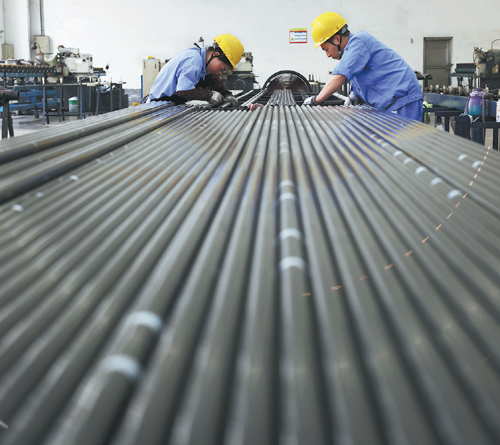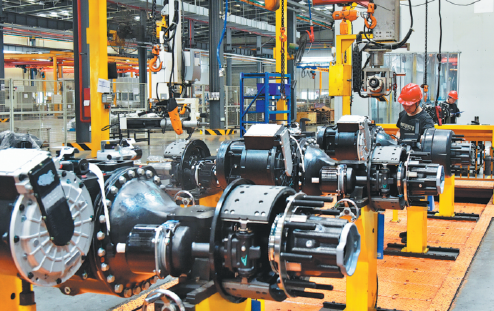China's private firms pioneer tech innovation amid policy support
Non-public sector has emerged as key driving force behind nation's technological development

BEIJING — China's private companies are spearheading breakthrough innovations across various key sectors, supported by favorable government policies that encourage entrepreneurship and unleash market vitality in technological advancement.
The latest data show that the private sector has emerged as a key driving force behind China's technological development, with private firms now accounting for over 92 percent of the country's high-tech companies since the beginning of the 14th Five-Year Plan (2021-25), according to the National Development and Reform Commission.
In recent years, Wuhu Churui Intelligent Technology Co Ltd has dedicated itself to developing high-performance AI computing batteries. The tech company, based in Anhui province — one of China's fastest-rising tech powerhouses — has secured a solid footing in the global power battery supply chain.
According to Zhang Huai, president of the company, its rapid development results from the deep integration of industry, universities and research institutes. "We have worked with several universities to build joint laboratories, and as an outcome of the collaboration, many of our technologies have reached globally leading levels," Zhang said.
This success story exemplifies how China's evolving policy framework enables private enterprises to thrive. The enterprise-led collaboration between industry, universities and research institutes represents one of the key policy measures outlined by this year's Government Work Report to help businesses advance technological innovation. Over the past years, the government has implemented multifaceted policies that foster a favorable environment for private firms to flourish.
A landmark development came in May this year, when China officially put into effect a historic private economy promotion law, which provides legal guarantees for enterprises to promote innovation. Notably, the law stipulates that support should be provided for the private sector to play an active role in advancing science and technological innovation, fostering new quality productive forces and building a modern industrial system.
Furthermore, eligible private firms should be supported to lead China's major technological breakthroughs, while the country's key scientific and technological infrastructure should be made accessible to private companies, according to the law.
Beyond legislative support for private companies' growth, the country has rolled out heavyweight policies to alleviate corporate burdens. From 2021 to the first half of 2025, China implemented a total of 9.9 trillion yuan ($1.38 trillion) in tax and fee cuts, with 72.9 percent benefiting taxpayers in the private sector. The government has also enforced a nationwide unified negative list system for market access and continuously reduced the number of items on the list.
These comprehensive measures are yielding measurable results, with recent indicators showing that China's corporate innovation vitality has strengthened, while new quality productive forces have continued to grow. In July, the purchasing managers' index for the equipment manufacturing and high-tech manufacturing sectors stood at 50.3 percent and 50.6 percent, respectively, with both remaining within the expansion zone. The high-end equipment manufacturing sector also maintained its expansion momentum.
In recent years, China's financial system has made continued efforts to expand financing access for private companies, including those committed to technological innovation.
The outcomes have been remarkable, with official data showing that outstanding inclusive loans for small and micro enterprises surged from 15.1 trillion yuan at the end of 2020 to 35.6 trillion yuan by the end of June 2025.
Building on this foundation, China has introduced innovative financing mechanisms to further diversify funding channels. A key move was the introduction of a sci-tech board in its bond market in May, which aims to better cater to the financing needs of technology firms.
Since its launch, the new platform has attracted a wide range of participants, with 288 entities issuing approximately 600 billion yuan in technological innovation bonds by the end of June. A prime example is China's leading AI company iFlytek, which successfully issued 800 million yuan technological innovation bonds with a coupon rate of 1.83 percent.
"We will spend the majority of the funds we raise on technological research, development and application, while continuously strengthening our technological advantages," an iFlytek spokesperson said.
Currently, 63 percent of China's A-share listed companies are private enterprises. In particular, private companies account for 74 percent of listings on the country's Nasdaq-style Science and Technology Innovation Board, reflecting their dominant presence in both China's capital markets and technological landscape.
Amid a raft of policies to ramp up private sector growth, the NDRC has set up a specialized bureau to promote the sector's development. As the country's top economic regulator, the NDRC has established a multilayered mechanism for communication and problem-solving between private companies and relevant government departments at all levels nationwide.
Looking ahead, Zhang Xiaolan, a researcher with the State Information Center, said that the development of new quality productive forces will present vast opportunities for the private sector. "With the implementation of a series of pragmatic measures, the innovation vitality and creativity of private companies will be continuously stimulated, thereby injecting strong momentum into the high-quality development of China's economy," the researcher said.
Xinhua


Today's Top News
- Xi's article on developing new quality productive forces to be published
- Beijing protests new US arms sale to Taiwan
- Economic growth in 'upward momentum'
- Strong ties with Thailand stressed
- Japan warned on Taiwan interference
- Takaichi's dangerous rhetoric revives Japan's militaristic past






























